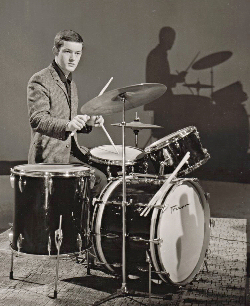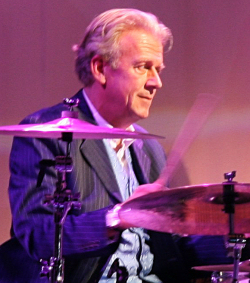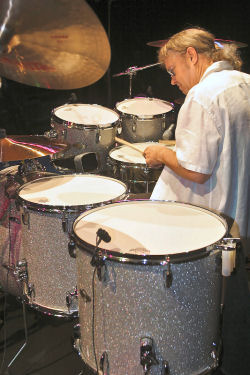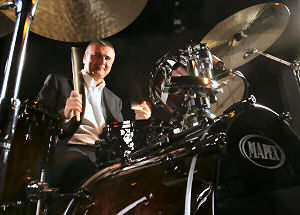
Steve White
Steve White – looking ahead and moving forward
Steve White is one of the most respected drummers in the U.K. and is renowned worldwide for having held the position of drummer for Paul Weller for over 25 years until; they parted ways in 2007.
Repeatedly featured in drum polls, festivals and magazines, Steve White has an unmoveable passion, dedication and love for the art which drives him to explore the possibilities both of different genres of music and different areas of the music business.
I caught up with Steve at the ‘World’s Greatest Drummer’ where with many other drummers he paid his tribute to his drumming heroes with the Peter Cater Big Band – a superb performance. His past history has been so well documented so this interview concentrates on his current projects as he talks about life after Paul Weller.
There is an obvious new chapter that’s opened since Paul Weller, where has this taken you?
It’s taken me on a series of diverse journeys to be honest. A journey that has made me accept the fact that I’ve got a lot of years of experience under my belt and made me feel that I wanted to give something back in many ways. I’ve been involved in the education side over the past two to three years but I’ve also diversified to the behind the scenes aspect of the music business. In particular, I’ve got involved in a music management company that been developing new talent and looking to discover new talent in Manchester.
We’ve got two young artists signed to various deals; one is signed to ZTT and another, Sam Gray, an incredible singer/songwriter who’s been signed to Notting Hill Records by a guy called Andy McQueen who was the chap who originally signed Dizzee Rascal. For me, that’s really exciting; to sit back and be able to impart my experience, good or bad, to some of these younger upcoming artists – I’m very comfortable in that position.
I’m not coming out of my twenties and thirties kicking and screaming about leaving my youth, I’m quite happy to be where I am and feel that I’ve achieved an amazing amount and still feel that I have loads more to achieve.
Coming off stage at Glastonbury in 2007, I knew as I was walking down the stairs that chapter was over. I felt that it was a very, very hard decision because I’ve got a tremendous love and respect for Paul as a person and as a friend. To walk away from it was really hard but I felt it was something I had to do and just felt that it had gone as far as it was going to go. On my part it was a massive decision on many levels and I still think it was the right decision.
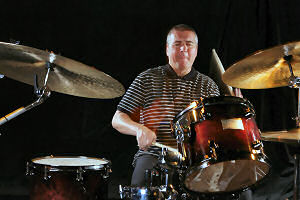
Steve White
You’ve accumulated a wealth of knowledge in drumming and drumming history. What drives you now?
To be honest and I don’t want this to sound pretentious about this, but in the forty odd years on this planet, I think that drumming in my world is the closest thing to a religion that I’ve touched upon.
The concept of putting your belief in something and leaving it to fate and think that everything’s going to be alright which at the end of the day is what religion is all about – I’ve never been able to buy into that. But as I’ve got older, I truly feel that drumming brings a positivity to my life that I kind of understand where music and drumming in Africa actually comes from – drummers!. The concept of drummers becoming professional musicians is a fairly unusual concept outside the west but drummers are such an integral part of the fabric of the culture in all parts of Africa, as diverse is the culture out there.
I feel that during my time here I get that, I really do. The fact that drummers love coming together to drum events, some are good and some are not so good but drummers love coming together because we are touched by something that’s quite spiritual and it’s the love of being part of that – I absolutely love it.
I don’t think I’ve ever become cynical or jaded by music, I do however have different views on the music business but music and business are two very, very different things. I still get that thrill whenever I listen to Buddy Rich, Al Jackson, John Coltrane, David Bowie, Elvin Jones, Philly Joe Jones and when I listen to Kraftwerk or Stevie Wonder I still that buzz as I did as a nine year old kid. As long as that’s there, I’m gonna be driven on.
Those names are obviously influences in your life. You recently performed at the ‘World’s Greatest Drummer’ event which is a celebration of big band end of your influences. What’s it feel like paying tribute in performance to those greats?
It’s was such an honour. To try and understand and emulate in a small way the kind of drumming, especially someone like Buddy Rich who was required to play every single night, you get an even deeper respect of his legacy.
I was talking to Karl Brazil, Ian Palmer and Pete Cater as well about this and you just get a deeper understanding of how good the man actually was. It’s absolutely amazing to sit there with that big band and having them powering up behind you and it’s a different sort of dynamic that you have to use and take a different feel and approach to the drums. I do think that playing jazz drums is the purist form of drumming really.
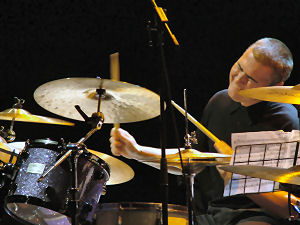
Steve White
There a so many genres of drumming, especially in the dance area. Have you now explored any of these areas?
Absolutely. There’s been an absolute explosion in our industry over the past decade or so. The amount of information that’s available via DVD, via YouTube, via the internet that if I was a young player now, on one level to be able to go onto YouTube and watch Billy Cobham playing with Horace Silver in 1968, I wouldn’t have dreamed to be able to have done that when I was twelve or thirteen.
On another level, there’s almost the argument that it can be too much of a good thing and although I’m so very appreciative and impressed by the sub genres and innovations that are coming into the drumming world, what I’d advised everybody to be careful of is to never lose sight of the fact of whatever kind of music you’re playing, you still need a good tune and you need a good song. To technically exert yourself on an instrument with music that has no musicality is not great drumming, it’s an exercise in technical development and I don’t really get that. When you hear something that’s in a genre that’s heartfelt and means something to the musicians involved, ultimately that’s when a drummer of any description is going to shine whether they are the fastest drummer in the world or the funkiest or just playing slow blues, it doesn’t matter the drums are an accompanying instrument and we shouldn’t ever forget that.
I recently, through my good friend Craig Blundell, got introduced to the Roland TD-20 and he’s been a massive influence in terms of saying, “listen, this a really great opportunity for you to grasp something that’s a little bit different”.
I challenged him and said “Come and show me how to do it” and bless him, and you know he did. He came round and I got the sandwiches in and he sat there and talked me through the workings of the gear and I have to say that it’s been and absolute revelation. It not only opens you up to play different styles in your demonstrations and your education but it pushes you and that’s got to be a good thing as a musician. So I’m really excited and keen as ever to listen to new music and check out the new guys and having a great time doing it.
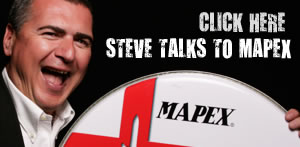
Steve White Mapex
There are some drummer’s out there that take the view that ‘chops’ is where it’s at, what’s your view?
Steve talks to Mapex
It’s fool’s gold. To sit down and shut yourself off from the real world and replicate technical exercises day in day out to be honest is quite easy if that’s what you choose to do. You become a socially inadequate person who doesn’t bring any emotion to the drums. What will happen with anybody going down that route is that you sever all ties with music and you end in the sub genre of the world’s fastest this and the world’s fastest that. Don’t get me wrong, I know that it is a valid pursuit for certain people but anybody who has an ounce of creativity that’s not a route you wanna go down. Its folly, it really is.
To replicate all those exercises with no thought about what you’re trying to say with the vocabulary of drumming, in my mind it’s a pointless exercise. For those who choose to do it I say knock yourself out with what you want to do.
For me personally, for the musicians and drummers I try and educate, I truly believe it’s not the right path but the drumming industry is all about selling drums and with that we’ve help create a little monster.
I truly appreciate some of the advances in technique but it has to have musical relevance for it to be of any kind of interest to me.
I personally think that what has happened over the last ten years, and I do think it will re-balance because there are some wonderful players out there showing us the way drummers like Stanton Moore, Keith Carlock and I saw a drummer called Chris Bussey playing with me at a clinic last night, fantastic young player and influenced by the current wave of New York drummers and it was so refreshing to see someone pushing themselves in a creative way rather than playing chops at four million miles an hour.
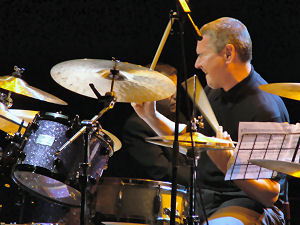
Steve White
I actually think to lock yourself away in a room for eight hours a day to pursue technical excellence is a life choice then God bless you but it’s actually far harder to sit down with a band and interpret a song and understand the lyrical intent of a songwriter and get it right. That’s why time and time again it’s the same drummers that get mentioned in dispatches when we do these polls or the ‘greatest of’, it’s always the same drummers. They have the ability to make a piece of music sound great and that may involve a great technical feat such as Buddy Rich doing ‘Channel One Suite’ or it may involve something as wonderful as Al Jackson playing on Otis Redding’s ‘Try A Little Tenderness’, an absolute tour de force in simplicity and that’s absolutely as valid as Buddy’s work. The whole intention was to make the music sound good.
I know education is a great love of yours, have you taken a different approach?
In the last couple of years it has been an organic process of development. I’ve been asked to do some education seminars and lessons and they’ve come back again. What I try to do is form a structure that supports what I learnt from Bob Armstrong, there are some great teachers out there – Dave Hassle, Stuie Ellerton, Rich Wilson. They’re out there doing a great job day in and day out and what I do is take all the elements of what I’ve learnt from these guys and take a student on a bit of a journey that will support that they’re going to a drum teacher on a regular basis. I’m focusing on issues in practice, relaxation, even a bit of psychology and I’m open to give the career’s advice for young drummers. Quite often a young guy that’s just about to break into the business or a guy who’s broken into the business will come along and we won’t even pick up a pair of sticks and we would start talking on issues like royalties and writing and that would be their time with me.
It’s not; sit down here’s a paradiddle, play this. It’s a bit more of a holistic approach to drumming and focusing on certain areas that drummers have trouble with. I do find that drummers have trouble with creativity. The technical excellence is always there but it’s the application, how to incorporate that with the music and that’s the one thing that I can share with them. As time has gone on I’ve got more material and to be quite honest I’ve got enough material for a big book if I ever get around to doing it. I’m really confident that in this sort of roll as not a full time educator but an educator that sees a guy once or a couple of times or on a regular basis, and they are the ones who’ve started on a practice pad and don’t touch a drum kit for a year. I just work on issues that drummers have a problem with.
On a formal level, I’ve been getting more and more involved with official colleges and doing work for B.I.M.M. in Brighton and masterclasses at places like Salford University and the Northern School of Contemporary Music and I also talk about drumming history seminar which is a prestigious thing for me.
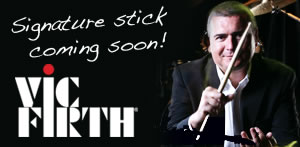
Steve White Vic Firth
With the colleges it tends to be a little more structured following more prescribed methods. At B.I.M.M. they have excellent course work and Adam Bushell has written the book and he was a student of Bob Armstrong.
Some of the colleges where you’re brought in not just as a drummer and you have to be up on your facts on history of the instrument, cultural history like the impact of how slavery has had on our instrument – you’re not talking to a group of drummers, you’re talking to a group of young musicians. Tailored in with that, I’m happy to talk about the industry because I’m working on the other side of the industry now and how that all works and young musicians are rightly intrigued about how they’re going to make their way into the business, so hopefully I can help on different levels.
The industry has changed massively and big budget expenditure has kind of become a thing of the past to a greater extent. With the onset of more website use and the fact that recording equipment is also more affordable to the musician, it’s obviously changed your outlook on the music and the business too. Has it made an impact on the musician and the business?
Totally!! I was really impressed with Bill Bruford’s autobiography and his decision to make a formal retirement. I spoke to him about this and he said, “well, why is that so strange?, I’m suppose to be a short note in The Times saying drummer dies in hotel room or something “. I really understand that and possibly at some point there maybe a time when I might turn and go “you know what, I’ve really had enough of this business”. It’s a tough business and it’s a business based on rejuvenation. It’s selling youth, it’s selling creativity, it’s selling things that require a lot of energy and some people get worn out by it in the end for various reasons.

Steve White
I don’t like that expression “it was better in my day!!!” because in some ways it was and in some ways it wasn’t. We didn’t have the access to all the technology and information that young players have now and at the end of the day there are a couple of factors which are short term.
One thing about the music industry is that it has not caught up with the digital revolution. The music business is pretty much run by middle class white men both in this country and in America and its very conservative. They never caught up with punk when that was happening until the plastic punks came along by which time the Sex Pistols were over. The music business is a great one for reacting late; it’s a bit of a ‘Johnny Come Lately’. I remember sitting down with a guy who is still an important figure in the music business back in 1990 who said Paul Weller’s finished and guitar bands are dead and that was before 2 million copies of ‘Stanley Road’ were four years from being sold and Oasis started rehearsing in Manchester. So these guys are notoriously slow to react in a business that’s very reactionary.
There are two major problems, one we are all coming to terms with the digital age, how to create income from downloading. It will happen and eventually, give it a couple of years, YouTube will not be free. You’ll be paying a couple of dollars on your mobile phone to pay for it that would eventually surface because they need to make money. Companies like Google don’t pay 28 billion dollars for something they’re not going to make money.
The other problem is that music business has turned over more money in the last few years, it’s one of our highest grossing industries – there is no recession in music. Glastonbury sells out immediately and so does V Festival.
The problem is from the past, companies like Atlantic would have the big money making artists then someone like Ahmet Ertegun as a lover of music would distribute some of that wealth back down to pay for Elvin Jones to make a record. It would be distributed back down the industry to pay for music that was not on the beaten track. That’s how reggae was given a chance by the success of other forms of music and it was money that was made from the likes of Herman’s Hermit and The Beatles that funded jazz labels. I remember talking to someone from CBS saying that Mariah Carey paid for their jazz label Sony Jazz.
That doesn’t happen now because the industry has had a double blow from the impact of the internet and revenue lost through that. What happens is that any money that is made goes back into the company to sustain their business model which quite frankly doesn’t work anymore. The money is there but it’s not being distributed fairly back through the industry.
The O2 is doing fantastically, V Festival is doing fantastically but 50 grand of that doesn’t go to a jazz label in Leeds, it doesn’t happen anymore. Because of this seismic change at the top, it’s going to take a time to re-balance itself.
Young musicians will always find the way through.
One slight downside is that you can go and study and some of the fantastic colleges at the moment but there is an assumption that everyone that goes to music college is gonna get a job in the music industry and sadly that isn’t the case – it never has been and it never will.
The young musicians that are creative and the ones who have the talent, providing they have the drive, they have every opportunity the same way that I did. Because it’s about your desire to drive forward – unfortunately that’s the one thing you can’t teach. You can’t teach somebody to be that successful or to know their own mind or to be creative.
Being a professional musician is huge undertaking these days. Some of the happiest guys I know are the ones who don’t do it professionally.
In times of recession it has been said that people tap into their creativity. They either console themselves by listening to music or in some cases, go back to picking up an instrument to become creative and have a good time with a bunch of other musicians who maybe in the same boat. What advice would you give to someone who is aiming to get back into ‘match fitness’ so to speak?
Funnily enough I spoke to a guy last night at the drum clinic who said that he was forty years of age and started playing drums twelve months ago. He said that he couldn’t believe how happy drumming makes him. He said that he knew he wasn’t going to play Wembley Stadium and I know I’m not going to have a No. 1 record but it gives me so much satisfaction to get in and play the drums.
The enjoyment is all, its all about enjoying yourself.
Simply it’s regular practice and it doesn’t have to be hours and hours. Just focus in and get yourself a little practice routine that you find the time or make the time without making excuses. It’s easy to sit in front of the computer for four hours or watching every episode of ‘Come Dine With Me’ – you can find the time if you want to, it’s pretty easy to be time distracted. So you have to put in a minimum level of commitment and if you get yourself under the tutorage of one of the excellent teachers around the country and with a little focus effort every day and you’ll be ‘match-fit’ in no time.
Equipment:
Drums: Mapex
Cymbals: Zildjian
Sticks: Vic Firth
Heads: Remo
Interview: Jerome Marcus
Photography: Jerome Marcus with additional photography: Courtesy of MAPEX
Website: www.jeromemarcus.com


